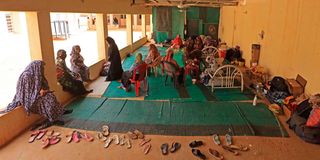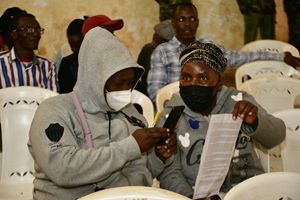'I still suffer nervous breakdown:' GBV survivor recounts ordeal as toll of Sudan war surges

Women displaced by conflict sit at a mosque in Sudan's northern border town of Wadi Halfa near Egypt on September 12, 2023.
What you need to know:
- Over 2.5 million girls, representing 74 per cent of school-age girls, are out of school, increasing their risk of harmful practices such as child marriage and FGM.
- The number of people in need of gender-based violence services has increased by 100 per cent since the beginning of the crisis, up to 6.7 million.
Kawther sadly recounted to the UN Women team recently how she and her family hurriedly left their home in August last year after they got a tip-off that some armed people were asking for them.
One of Kawther’s relatives works in the military and, therefore, she was lucky to get the information before they were caught by the armed men.
Kawther recalled how she and her family fled their home on foot and were repeatedly stopped at checkpoints. She recounted how a soldier approached her at one checkpoint, started touching her body inappropriately while trying to confiscate golden bracelets tied around her waist.
Kawther told the UN Women team how she stopped the search and said she would voluntarily hand over the bracelets, her 13-year-old son attempted to defend her.
“The soldier held the gun to my son’s head to threaten him. I was afraid for him and begged him, screaming that my son was still a child and did not understand what he was saying. The soldier searched the family’s documents, claimed that foreign visas in my son’s passport were illegal, and placed my son under arrest. I spent the rest of the day desperately seeking my son’s release,” she said.
After what she describes as an exhausting and dangerous search trip, Kawther found her son at 8pm in one of the Rapid Support Forces (RSF) camps. He was in a bad condition, especially as he had diabetes.
“We were detained together at that camp, where we experienced poor treatment and daily beatings. After 15 days, the chaos of nearby military clashes allowed us to escape, and we eventually found our way to an IDP shelter,” she added.
When they arrived at the shelter, Kawther suffered a “nervous breakdown” due to the stress of the previous weeks. Her son’s damaged mental health and the humiliation he got prompted her to have suicidal thoughts.
“I suffered and still suffer a lot from the effects of the beatings on my body and from exhaustion,” she concluded.
Kawther’s testimony mirrors those of thousands of other women and girls who continue to be affected by the ongoing war in Sudan.
Gender Alert published on Monday by UN Women shows the ongoing war has had catastrophic impacts on women and girls. The alerts show there are about 5.8 million internally displaced women and girls.
Food insecurity
Sudan is facing the worst levels of acute food insecurity ever recorded in the country, with 64 per cent of female-headed households experiencing food insecurity compared to 48 per cent of male-headed households in 10 states. Women and girls eating the least and the last.
Access to healthcare services is another challenge, as 1.63 million women of reproductive age are without adequate services. Among them, over 160,000 are pregnant, and about 54,000 childbirths are expected in the next three months.
Over 2.5 million girls, representing 74 per cent of school-aged girls, are out of school, increasing their risk of being subjected to harmful practices such as child marriage and female genital mutilation.
The number of people in need of gender-based violence (GBV) services has increased by 100 per cent since the beginning of the crisis, up to 6.7 million by December 2023. This figure is estimated to be higher today.
While men and boys are also victims of GBV, most of these cases involve women and girls. The ongoing violence, particularly in Khartoum, Darfur, and Kordofan, has exacerbated the risks faced by women and girls, with rising reports of conflict-related sexual violence, sexual exploitation, and abuse.
Women and girls also continue to be disproportionately impacted by the lack of safe, easily accessible, and affordable water, sanitation, and hygiene. At least 80 per cent of the internally displaced women are unable to get clean water because of affordability, safety and distance concerns.
Hodan Addou, acting Regional Director for UN Women’s East and Southern Africa office, said women and girls face unimaginable challenges, yet their strength and resilience continue to inspire.
“We cannot let Sudan become a forgotten crisis. Now, more than ever, the international community must rally together to support women in Sudan, ensuring they have the resources and protection they need to survive and rebuild their lives,” Hodan said.
UN Women, in the gender alerts, says action must be taken urgently to ensure the physical protection of women and girls, as well as secure access to food, safe water, and sexual and reproductive health services. It is supporting community-based initiatives, in partnership with women-led organisations, building resilience and ensuring access to critical humanitarian services for women, men, girls, and boys affected by the crisis.
The UN agency is calling on the international community, donors, and humanitarian partners to prioritise the protection and empowerment of Sudanese women and girls, including through increased funding for local women-led organisations, which received only 1.63 per cent of the Sudan Humanitarian Fund’s financial resources in 2023.
According to UNHCR, more than 10.2 million people have been displaced since the war broke out in April last year. This includes more than 7.9 million people displaced within Sudan and 2.1 million people who fled to neighbouring countries.
Chad has received the largest number of people (629,524), followed by Egypt (500,000), South Sudan (166,955), Libya (96,061), Uganda (49,500) and Ethiopia (37,124).
In South Sudan, most of those arriving are nationals (596,503) who had been living in Sudan as refugees.





